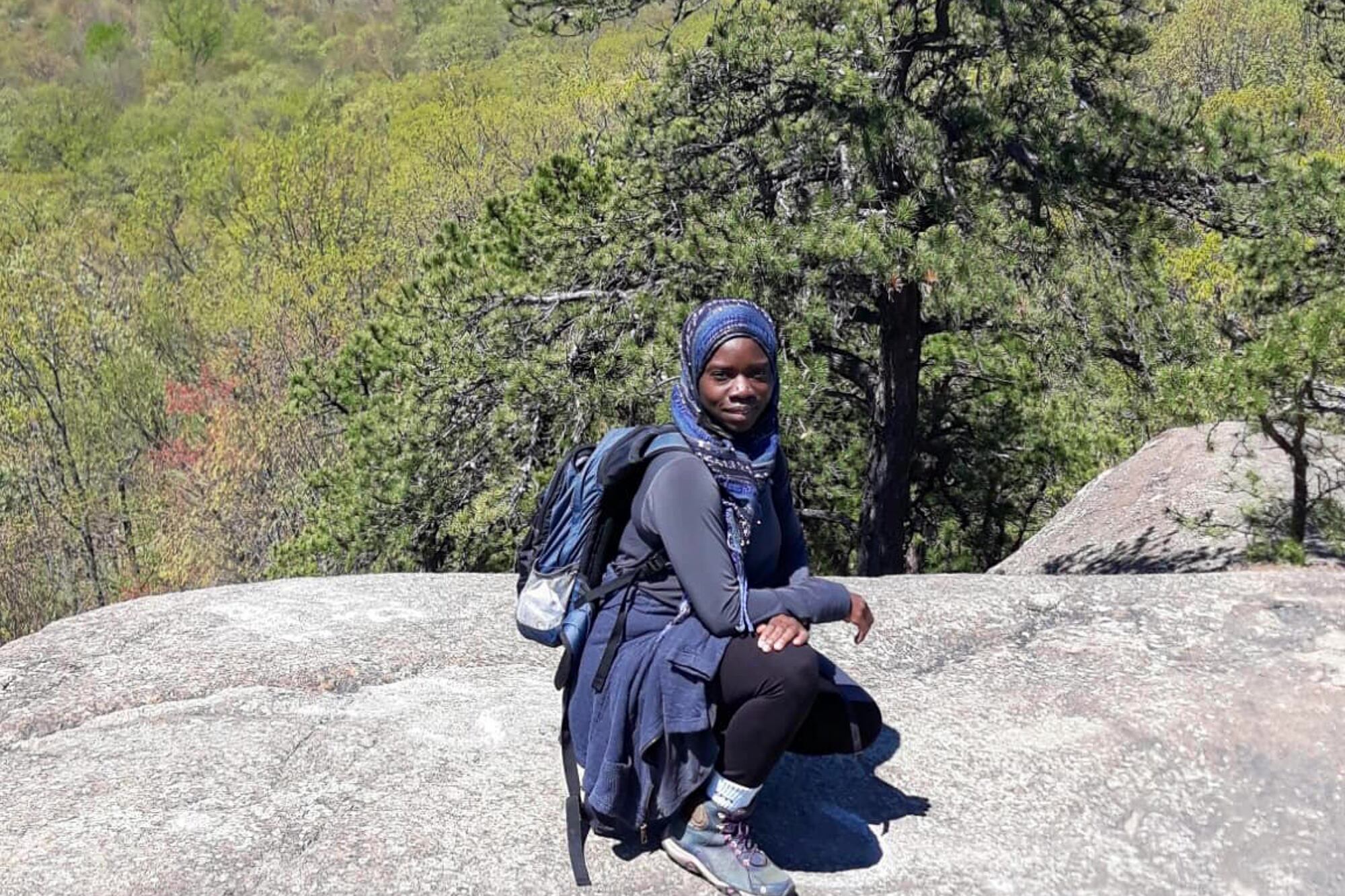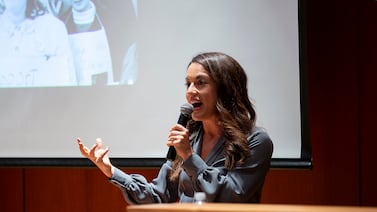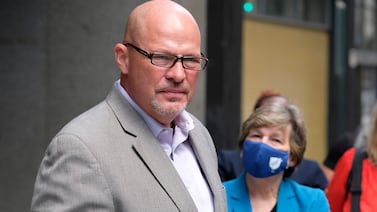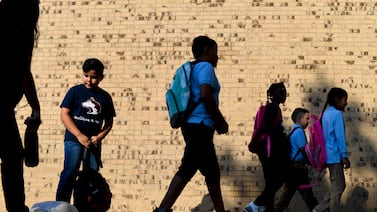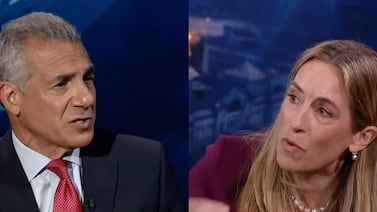As a young girl living in Guyana, Nubia Lumumba used to recruit kids in her neighborhood for her makeshift school in her backyard.
For the past eight years, she has had a classroom of her own, and the Newark educator brings to it a deep level of empathy and compassion for her students.
“I try to find time to have meaningful one-on-one conversations with students about their dreams and struggles so that I can connect with them on a personal level and offer them support and encouragement,” said Lumumba, who, until resigning this month, taught high school English at Newark School of Global Studies.
She spoke recently with Chalkbeat about supporting her students who have faced racist harassment, advocating for a more welcoming learning environment, and inspiring the next generation of young leaders to live authentically and unapologetically.
This interview was edited for length and clarity.
How and when did you decide to become a teacher?
I knew that I wanted to become a teacher when I was in elementary school. I was fascinated with discovery and learning, and I wanted others to get the same thrill I got from learning new things. When summer rolled around and we were on break, I would summon a few kids in my neighborhood to come to my makeshift school in my backyard. I remember collecting the discarded pieces of white chalk that had become two stubby for my teachers to grasp, and using these bits to write out vocabulary words that I wanted my “students” to practice spelling and using in a sentence.
What’s your favorite lesson to teach and why?
I love teaching students how to offer analysis on something that we have read or viewed. A single lesson on analysis allows students to practice multiple skills. They are required to read closely, draw inferences by synthesizing background knowledge with new information, and effectively communicate nuanced ideas in written or verbal form. Analyzing is an essential skill that many students struggle with, even at the college level.
I usually introduce this skill by having them examine a complex image where multiple meanings can be explored. At first, students are concerned about being right or wrong when they offer analysis, and I have to explain to them that it’s not about being right or wrong, but how well they can support their ideas with evidence and reasoning. With some practice, students are then able to apply what they learn about analyzing images to actual text.
What’s something happening in the community that affects what goes on inside your classroom?
The division between Black and Brown people and weariness about the “other” within the community has had a direct impact on our school and has seeped into my classroom. Division amongst Black and Brown people serves no purpose but to uphold white supremacy.
For at least two years, Black students at my school have complained about being bullied by non-Black peers. Black students have been called all types of racial slurs, and their complaints were dismissed by adults who have a legal and moral responsibility to protect all children regardless of their skin color. I was sad to see some of my Black students transfer out of the school because they didn’t feel safe and valued. All students and staff should be made to feel safe, protected, and welcomed in the school that they attend/serve.
How do you approach news events in your classroom?
I think that it is critical to incorporate news events in the classroom as part of students’ overall learning because a well-informed citizenry will likely uphold democracy and support social justice efforts. Sometimes the news events we discuss in the classroom can be as heavy as politics or as trivial as which team should have won the 2022 World Cup, Argentina or France? Most of my students felt that the French team should have won. Over the course of four weeks, their focus was intently set on who would claim the golden trophy, and I practically had to pry their phones away from them. Allowing students to discuss topics that are of great interest to them, such as the World Cup, enables them to practice essential skills such as analyzing information, evaluating evidence, and constructing arguments.
Other times, the news event can be something that may not spark deep discussion but allows students to see concrete examples of how skills and concepts that they learn in my English class are applied in the real world. For example, when Queen Elizabeth passed, the Washington Post published an article about her in which I found a particularly beautiful example of figurative language that I wanted my students to identify: “The queen spent the autumn of her life coming to terms with family scandals but also with a media hunger for them unknown when she was a young queen.” Students were able to identify the metaphor in this excerpt and discussed how the effective use of figurative language can enhance one’s writing and captivate the reader.
Tell us about your own experience with school and how it affects your work today.
Growing up in a developing country, we had limited resources to aid us in our learning. Our schools were run in a militaristic manner, our lessons were teacher-centered, and we were seldom given opportunities to have discussions with our peers during class and to collaborate with them.
Now that I have been blessed with the opportunity to become a teacher, I try to implement the good that I have learnt from my own experience with school, because it wasn’t all bad, and what I know are best practices for teaching in a modern classroom. I incorporate learning aids into my lessons that will suit the various learning styles and needs of my students. I employ a more democratic style of teaching and learning where students get to be part of the decision-making process as it pertains to classroom rules, assignment choices, deadlines, and whom they wish to collaborate with.
What’s the best advice you’ve ever received, and how have you put it into practice?
The best advice that I have received was from one of my education professors at Montclair State University, Dr. Vincent Walencik, and from my former co-teacher, Alfredo Montas. The first day that I had classes with Walencik, he said that the secret to good teaching was that you had to, “Get the kids here,” at which point he touched his heart, “before you can get them here,” and then he touched his head. From that bit of advice, I garnered that I needed to establish a sound rapport with each of my students in order to motivate them to learn.
Montas’ advice fit perfectly with my professor’s because he told me to, “just be yourself with the kids, and they’ll love you.” I try to put these two pieces of advice into practice by allowing students to see me as my authentic self, not just the poised professional that I can be. My students get to see me in all my goofy glory when I tell corny English jokes, execute terrible versions of the latest TikTok dance craze that my students are so fond of, and on a really good day, I may even give students a sneak peek of my rap game. Most students respond well to me trying to cultivate a good student-teacher relationship; however, there are always a few who remain reserved. In this case, I do not force a deeper connection, but I ensure that all students are aware that I am there for them whenever they need me.
What’s one thing you’ve read that has made you a better educator?
I can’t recall exactly when and where I read this, but learning that all children come to school wearing an “invisible backpack.” The premise is that childhood trauma affects students’ ability to come to the classroom prepared to learn. Their thoughts and emotions surrounding the difficulties they face in their personal lives cannot be turned off like a light switch once they enter the classroom. We, educators, have to understand this and be responsive to our students’ needs whether they choose to share their specific struggles with us or not.
Consequently, I have developed a deeper level of empathy and compassion for my students. I have learnt to listen more actively to my students instead of rushing to offer them strategies on how to solve their problems. The “invisible backpack” that our students carry are often heavy and overflowing; it is our job as educators to lighten the load for them in whatever manner we can. Moreover, I encourage autonomy in my students so that they can develop strategies of their own to cope with the issues they are having. I assure them that I am willing to support them as much as I possibly can.
How do you take care of yourself when you’re not at work?
I especially love doing outdoor activities, which gives me a chance to channel the healing properties of nature. I engage in bike riding every so often and depending on the time of year, I’ll go for a hike after work and especially on the weekends. I am actually certified to lead hikes with the Appalachian Mountain Club, and I have been leading adult and youth hikes since 2017 with a local group named HIKEOLUTION, which was founded by my friend, Keyana Jones. Some of the things I do at home to take care of myself are trying new vegetarian recipes, reading various genres of literature, and binge-watching apocalypse shows and movies. Lastly, my children and I have three cats, and we find great joy in playing with them which is very therapeutic after a long stressful day. As naughty as they are, those cats always manage to put a smile on our faces.
Jessie Gomez is a reporter for Chalkbeat Newark, covering public education in the city. Contact Jessie at jgomez@chalkbeat.org

